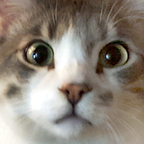Q&A: Crazy Cat Lady?
Q: Why are single women with cats stigmatized while single women with dogs aren’t?
A: I could talk about how cats and women have been tied together throughout history through myths like those of Bastet and Freyja. I could talk about how those associations led to literal witch hunts and mass slaughters of cats, but I don’t believe that has a lot to do with the contemporary idea of the Crazy Cat Lady myth.
I believe this happens because of several stereotypes and misconceptions. Any one of these things might be responsible for saying a single woman is a crazy cat lady, but when you start combining them, that’s when an idea pervades our discourse and rhetoric. It becomes this iconic phrase that most everyone in places where there are cats and single women can look at and identify someone they know, even when the criteria they use to label her as a crazy cat lady may be completely different from someone else’s.
The major contributing factors are:
First, people wrongly assume that cats are not as loving and affectionate as dogs are. This then contributes to one of the most idiotic, misogynistic concepts ever: that these single women must therefore be frigid (ugh I hate that word), just as incapable as those cats to show affection. So, on the flip side of that, where people see dogs as openly loving everyone, dog owners get a pass on the frigidity debate (at least for choice of pet).
The second factor is that single women over a certain age are either seen as pathetic (because she hasn’t managed to bag a spouse, as if a woman cannot possibly be content without a mate) or as bitchy, frigid, cold, or any other such qualities that would explain her being single. Evidence of this tendency to cast unmarried women as failures to marry can be seen in the way the terms spinster and bachelor are interpreted and used.
A third factor is that there’s also a long history of using cat-like words as pejoratives to describe women. Words like catty, kitten, cougar, and catfight are just a few examples. Both cats and women are often characterized as being sneaky, manipulative, and difficult to please. All of which is your average stereotypical nonsense.
Fourth, many women also regularly talk to the cat(s), and pour a great deal of time, money, and affection into taking care of their feline friends. And when you add these things up, it may look to an outsider as if this woman is a bonkers crazy cat lady, who presumably thinks her cats understand what she’s saying (not true, many people — including myself — just enjoy having a chat with the cat). Cats can be ASTONISHINGLY empathetic, and they are often great listeners.
In some cases, there may be actual mental health, dementia, and declining cognition issues, just like their married counterparts, but they may not realize just how bad things are on their own (or they may fear seeking help, thinking they will lose their freedom). Those are the cases where the term Crazy Cat Lady is truly offensive. We should be working to help those women get the care they need while maintaining their freedom for as long as possible, which should include help with caring for pets. Those pets may be the only thing keeping a woman who simply needs some help from turning into a woman in crisis.
There are some great organizations out there helping seniors/disabled and pets stay together. Look for one in your area to volunteer. If there isn’t one in your area, you could consider starting one. This is an issue we should all think more about.
